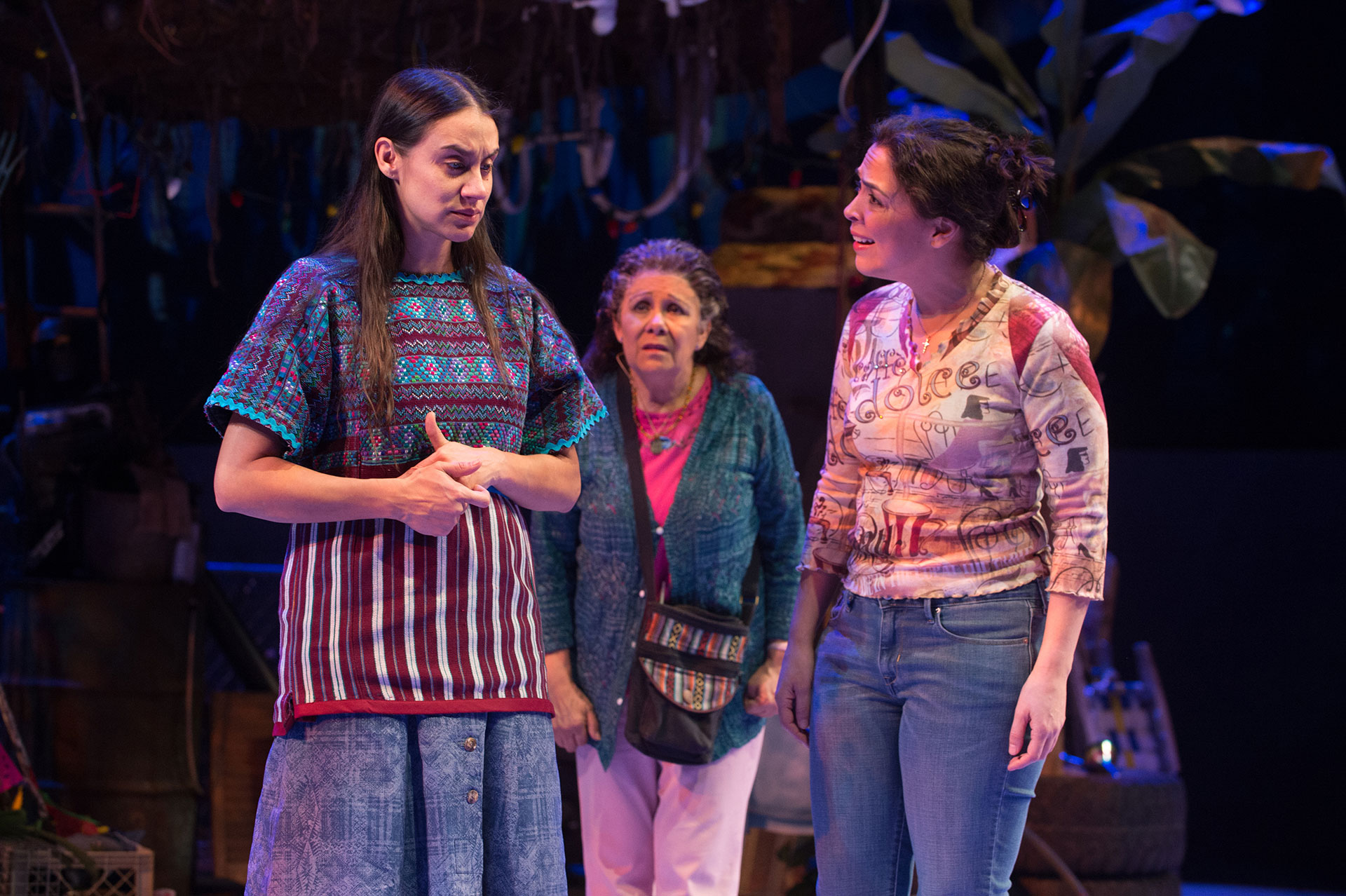 |
| Oregon Shakespeare Festival photo by Jenny Graham |
So clearly I go into this with some trepidation, yet also having had several people I trust tell me it is the best thing they've seen at Ashland this summer.
The Play
The basic outline of Medea is that Medea, a foreign princess, marries Jason after his quest for the Golden Fleece. Because of Jason's ambitions, he marries another woman, though promising to love and support her and their children. Medea doesn't buy it, kills the other wife and the children, and flees to Athens. There is a lot more, but that's the nut of it.Mojada: A Medea in Los Angeles keeps a lot of that basic plot and adapts it to the plight of contemporary Mexican immigrants to Los Angeles. In this variant, Medea (Sabina Zuniga Varela) and Jason (Lakin Valdez) have fled Michoacan, Mexico, with their son Acan (Jahnangel Jimenez) and Tita (VIVIS), her longtime family housekeeper. They cross illegally into the U.S. and settle in Los Angeles where Medea sews piecework and Jason works in construction. Jason has ambitions to rise up in the business, run by a very successful immigrant woman, Armida (Vilma Silva), and tries to assimilate, as does Acan. Medea, traumatized by the trip north, refuses to leave their home and yard. She eventually befriends Josefina (Nancy Rodriguez), a baker and street vendor Tita has met.
The first half or so of the play shows the struggles of the family trying to get by, move up, and get along in L.A. Medea shows that she is a whiz at sewing. Tita hints at abilities beyond mere housekeeping, tending an herb garden. Medea tries to keep Acan in touch with the culture they have left behind. Meanwhile, Jason and Armida have other ideas that don't so much include Medea. When Medea learns that they have married and plan to take Acan with them while sending Medea away, things turn ugly.
The Production
As I write this, about a week after seeing the show, the production has already closed. It was a first half of the season only production, which is unfortunate, because the penultimate performance we saw was tremendous. The cast was outstanding. VIVIS as Tita serves as the Greek (well, Mexican) chorus, Medea's conscience and cultural touchstone. She manages to be both wonderfully comical and touchingly sad: a terrific performance throughout. Medea and Jason seem to have real chemistry and affection, but Jason's frustration with Medea's inability to assimilate or even associate is palpable, and you begin to see the fractures and the seeds of the eventual confrontation. And Ashland veteran Silva is utterly stunning as Armida. Her iron will and determination show exactly why (and how) she has been so successful. It's quite understandable why Jason would find her an appealing mentor and more.Playwright Luis Alfaro does a wonderful job crafting believable dialogue that rings true. The mix of Spanish and English effectively at gives the sense of people from one culture feeling their way into another, and the change from a seemingly successful immigrant story turning quickly into a tragic betrayal and murder is handled credibly and almost seamlessly.
Perhaps best of all is that none of the characters come across as one-dimensional or archetypical. They all feel quite real and plausible, which makes the tragic turn all the more painful. You can totally see how the turn of events could drive an outcast, immigrant woman with no options to completely lose it.
Bottom Line
There is a reason these classic stories never go away. The immigrant in a strange land, the ambition, the betrayal: all of these are themes that can easily translate into almost any cultural setting. The application of the plight of undocumented immigrants in the U.S. is a timely and poignant example of just such a setting. This story, unfortunately, makes perfect sense in that context.It's brilliantly written and performed, and I wish it were still playing so I could recommend seeing it. But I suspect it will reappear somewhere. This production is very, very strong.
I have to agree that at least so far, of the six plays I've seen at Ashland this summer, this one was the best. It is definitely the one that has been on my mind the most in the intervening week, and not just because we saw it last. The power of both the story and the performance really got under my skin, and has me thinking a lot about both the play and the cultural climate that makes it feel so relevant today. That's the power of really good theater.
Final Footnote
The counter on my Blogger account tells me this will be the 100th posting since I started this blog back in May of 2016. Not every post represents a play viewing (though most do), and not every play I saw turned into a posting (hello again, Hamlet!). But it's safe to say I saw something on the order of 100 plays in the last year or so. And I still don't think it constitutes "too much theater" for me. It is a strain a times (because I've already seen another play I need to blog about, so I'm behind again!), but I enjoy making these notes and I appreciate the feedback both here and on Facebook.I look forward to more of these posts and discussions!
No comments:
Post a Comment